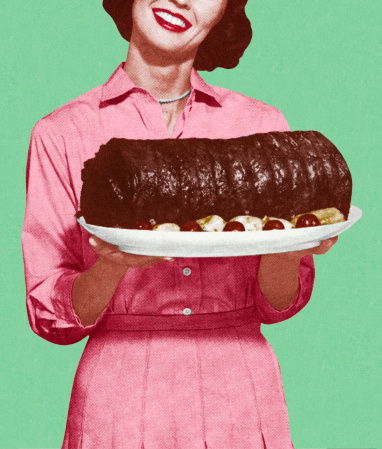When I moved to the west coast half of my luggage consisted of books I couldn’t bear to leave behind. With the goals of saving space and not breaking my back in mind, I now predominantly purchase e-books. Occasionally there is a book that catches my eye that I can’t buy online or leave behind, though.
My most recent “real” book purchase is a gem from 1953 called Your Home and You: Unit Course in Home Economics.
I found it in a British Columbia thrift store nestled in with records and cigarette boxes. With a once-bright-yellow cover now faded with age Your Home and You features a pink silhouette of a perfectly-coiffed woman arranging flowers at a table filled with food she has prepared. Eyeing it, I couldn’t help but think, “Oh, this is going to be good.” The inside cover had a list of neatly-penned names of the previous owners and the pages have their notes in pencil. There are several pages in each chapter depicting sketches of Suzy Homemakers-in-training with “RIGHT” and “WRONG” written underneath them. The wrong way to hold a spoon (Do not put the bowl of the spoon in the mouth) and the right way to hold a spoon (Do put the side of the bowl of the spoon to your lips). And so on and so forth.
Ugh. A textbook about being the perfect housewife.
I paid the thrift store owner my toonie (two-dollar Canadian coin) and plopped the thick text onto the truck’s dash, looking forward to diving into it again later. Later that night when I went to read it I re-learned a lesson I thought I had comprehended long ago: Never judge a book by its cover.
Sure, there are the moderately to extremely obnoxious sidebar drawings coaching women on the correct ways to brush their teeth, check the temperature of their meat, and having a cheerful face, but there was some actual good there, too. Simple, straightforward advice that can seemingly only come from our parents and grandparents, like the kind my grandma includes in my birthday cards (“Easy does not translate into adulthood, Mandi. Love, Grandma”). To my surprise, the book also encourages women to look for work and even has a whole chapter on doing well at a job interview and in the work place. Your Home and You ended up being a pretty decent guidebook to being a good human being, not just a good housewife.
Here are a few of my favorite excerpts that translate from 1953 to 2014:
Hey Unthoughtful Roommate:
“It is so necessary to see the other person’s point of view. This ability to look at a problem through another’s eyes is essential in creating a good home atmosphere. It serves as a basis for the solution of problems both in and out of the home.”
“It is true that yielding may mean peace, but only at a sacrifice of the proper development of each person. No one person should take all or give all.”
“Uninterrupted sleep should be the right of every person.”
First Date 101 for Men:
“Here is a summary of suggestions for effective or pleasing conversation:
1. Have something worthwhile to say.
2. Let the other person speak. Discover her interests by remarks or questions.
3. Listen attentively and interestedly.
4. Keep your conversation free from too much talk about yourself.
5. Keep it free from bitterness and gossip.
6. Avoid heated arguments.
7. Let your voice and attitude express tolerance and friendliness.”
Things You Want to Say, but Can’t
“There is no place for a grouch in the home, at social gatherings, or is business. No person can be grouchy and expect to have friends or to succeed in business or other occupations.”
“Applesauce flavored with orange is delicious. Cereals help to make the wheels go round.”
“Unless one takes himself in hand, eating one sweet simply leads to eating another, and another, and so on. Such an unbalanced practice crowds out milk, vegetables, fruits, and eggs, as well as bread and butter.”
“To make coffee of fine flavor, use a very clean coffeepot of porcelain or glass. Do not overcook the coffee. Do keep it hot. To make coffee clear, strain it or use eggshells.”
Common Sense That Isn’t So Common Anymore
“At a movie, no boy or girl thoughtful of the comfort of others reads aloud the captions on the screen, or makes remarks, or holds a prolonged conversation during the picture.”
“More friends can be made in a week by becoming genuinely interested in other people than in a year by trying to get other people interested in oneself.”
“Another way in which love can be expressed is in being tolerant of other persons. Because one does not think as you do about politics and about religion is no reason why you should hate him.”
“In being a true friend, no qualities count more than sincerity and loyalty. To keep a friend one must not only trust and believe in him, but also be kind and considerate of him. Be tactful to a friend. Do nothing to irritate or wound him.”
“‘Excuse me’ or ‘Please pardon me’ or the more modern ‘I am sorry’ are phrases used when accidentally passing or reaching in front of another.”
Raising babies
“There are several reasons why it is a pity to break faith with a child, one of them being that confidence is the basis of obedience. Children usually obey persons whom they trust. In order to help a child to obey, you should tell him no untruth, and should make no promise that you cannot fulfill. It is just as necessary to be honest and square with helpless children as with other persons.”
“Clothes that are so unattractive or so fussy that they make a child self-conscious interfere with his mental health. Enough attention should be given to a child’s clothes to make him appreciate and take care of them. However, too much discussion about clothes may make him self-conscious or even snobbish.”
On Hosting Your In-laws or Moochy Friends
“A guest whom the family is sorry to see leave is one who shows interest in everyone in the household but is not curious about personal or family affairs. He does not expect to be entertained every minute; he appreciates that the family may want a little time to themselves. Hence he reads or entertains himself in some way but does not do this all the time. He joins heartily in all the affairs in which he should participate.”
“If the guest uses the family bathroom, he may make his presence very trying by remaining in the bathroom an unreasonable length of time, especially during the morning hours, when some members of the family may need to hasten to their work.”
$$$
“The pale-blue and tea-rose tints were so alluring that she hesitated which to choose. ‘Why not buy one of each color?’ asked the clerk. Impulsively Rose bought both slips. But later, when thinking the matter over, she realized how foolish she had been. She really did not need slips but she did need hose, and now all her money for clothes was spent. It is necessary to plan not only how much to spend for clothes but just what to buy with the allotted money.”
“In spending money it is important to realize that since one cannot buy all one wishes, money should be spent for the things that give the greatest satisfaction, in the long run.”
Basic Beauty
“A Saturday-night bath and a daily smear of water on face and hands is not enough. Much bathing is needed to look at all times ‘crisp as lettuce.'”
As you can see, while the language might be outdated, as well as the social circumstances in which they came about, some of the sentiments expressed are timeless. Here’s to being kind and thoughtful money-managing hosts and mothers all while looking crisp as lettuce!



















